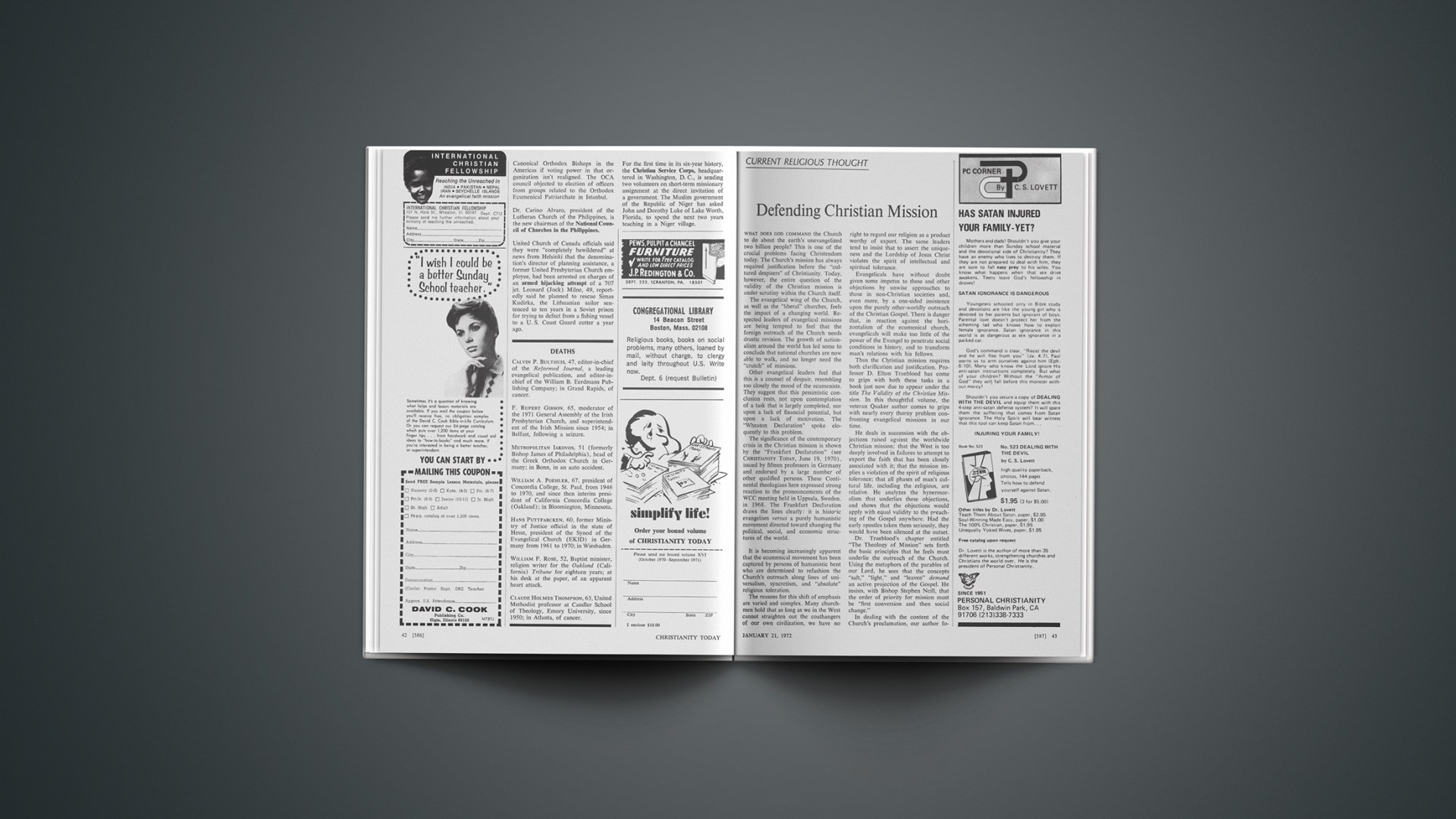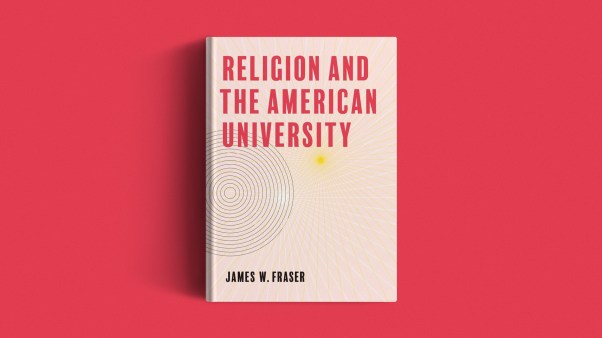What does god command the Church to do about the earth’s unevangelized two billion people? This is one of the crucial problems facing Christendom today. The Church’s mission has always required justification before the “cultured despisers” of Christianity. Today, however, the entire question of the validity of the Christian mission is under scrutiny within the Church itself.
The evangelical wing of the Church, as well as the “liberal” churches, feels the impact of a changing world. Respected leaders of evangelical missions are being tempted to feel that the foreign outreach of the Church needs drastic revision. The growth of nationalism around the world has led some to conclude that national churches are now able to walk, and no longer need the “crutch” of missions.
Other evangelical leaders feel that this is a counsel of despair, resembling too closely the mood of the ecumenists. They suggest that this pessimistic conclusion rests, not upon contemplation of a task that is largely completed, nor upon a lack of financial potential, but upon a lack of motivation. The “Wheaton Declaration” spoke eloquently to this problem.
The significance of the contemporary crisis in the Christian mission is shown by the “Frankfurt Declaration” (see CHRISTIANITY TODAY, June 19, 1970), issued by fifteen professors in Germany and endorsed by a large number of other qualified persons. These Continental theologians here expressed strong reaction to the pronouncements of the WCC meeting held in Uppsala, Sweden, in 1968. The Frankfurt Declaration draws the lines clearly: it is historic evangelism versus a purely humanistic movement directed toward changing the political, social, and economic structures of the world.
It is becoming increasingly apparent that the ecumenical movement has been captured by persons of humanistic bent who are determined to refashion the Church’s outreach along lines of universalism, syncretism, and “absolute” religious toleration.
The reasons for this shift of emphasis are varied and complex. Many churchmen hold that as long as we in the West cannot straighten out the coathangers of our own civilization, we have no right to regard our religion as a product worthy of export. The same leaders tend to insist that to assert the uniqueness and the Lordship of Jesus Christ violates the spirit of intellectual and spiritual tolerance.
Evangelicals have without doubt given some impetus to these and other objections by unwise approaches to those in non-Christian societies and, even more, by a one-sided insistence upon the purely other-worldly outreach of the Christian Gospel. There is danger that, in reaction against the horizontalism of the ecumenical church, evangelicals will make too little of the power of the Evangel to penetrate social conditions in history, and to transform man’s relations with his fellows.
Thus the Christian mission requires both clarification and justification. Professor D. Elton Trueblood has come to grips with both these tasks in a book just now due to appear under the title The Validity of the Christian Mission. In this thoughtful volume, the veteran Quaker author comes to grips with nearly every thorny problem confronting evangelical missions in our time.
He deals in succession with the objections raised against the worldwide Christian mission: that the West is too deeply involved in failures to attempt to export the faith that has been closely associated with it; that the mission implies a violation of the spirit of religious tolerance; that all phases of man’s cultural life, including the religious, are relative. He analyzes the hypermoralism that underlies these objections, and shows that the objections would apply with equal validity to the preaching of the Gospel anywhere. Had the early apostles taken them seriously, they would have been silenced at the outset.
Dr. Trueblood’s chapter entitled “The Theology of Mission” sets forth the basic principles that he feels must underlie the outreach of the Church. Using the metaphors of the parables of our Lord, he sees that the concepts “salt,” “light,” and “leaven” demand an active projection of the Gospel. He insists, with Bishop Stephen Neill, that the order of priority for mission must be “first conversion and then social change.”
In dealing with the content of the Church’s proclamation, our author focuses attention upon the very elements that are repudiated by the ecumenical view of “mission.” Emphasizing that “tolerance” and non-interference in the spiritual lives of others find no support in Scripture, he declares that “soul saving” is the cutting edge of the church’s mission, and more important still, that it is the final truth of Christianity that undergirds the entire Christian task.
Nor does Friend Trueblood permit any simplistic view of “mission” to neutralize or invalidate the overseas obligations of the Church. While recognizing that the entire human scene is the proper locus of evangelical endeavor, he insists that there are areas of the world that have a special claim upon the Church’s outreach.
This volume should serve to call all branches of the Church to face up to the central elements of the Christian proclamation: natural man’s forsaken condition outside Christ, his common need for the touch of the hand of the Resurrected One, the reality of Christ’s continuing presence to the believer, and the transcendent hope that men and women find in him.
Trueblood’s volume is full of challenges to those who deny the validity of the Christian mission. He reminds us all that the day may come when virtually every “service” that missions (and especially the ecumenical “mission”) have rendered will be taken over by governmental agencies. He asks, “Will the case for the existence of the World Christian Mission then be stripped of its validity? It will, unless there is another factor which involves real permanence.”
An interesting metaphor underlies a great deal that the volume expresses, that of “the narrow way with wide gutters on both sides.” With this Trueblood challenges the familiar cliché about all roads eventually reaching heaven, and at the same time cautions both evangelicals and ecumenists at the point of their particular peril.
Perhaps the most penetrating insight of our author (and this pervades the volume) is that the social outreach of the Church must be justified and validated by its evangelistic message, and not the reverse. Thus the ministry of the servant of Christ to the hungry, the cold, the disadvantaged of the world must be regarded as a verification of the Christian faith, not a substitute for it.
The final justification of the Church’s mission is of course the mandate of the Lord of the Church. Beyond all logical arguments for the validity of the Christian mission, the final appeal must be to the power of the Risen Christ to change the lives of men and women.
HAROLD B. KUHN










